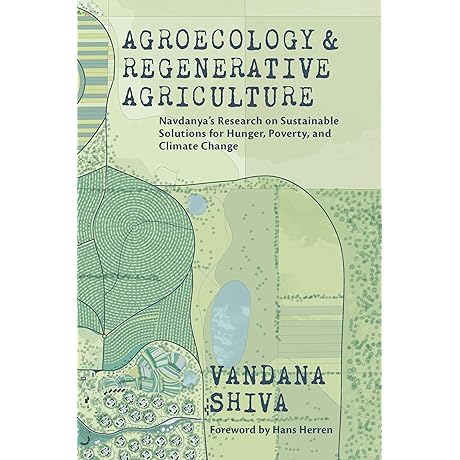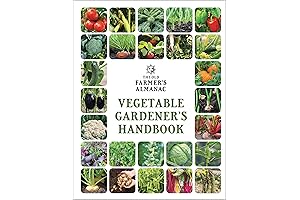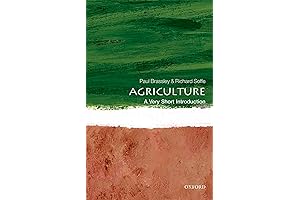· agriculture · 13 min read
Best Books for Agriculture & Grounds Management in 2024
Discover the top-rated books that will elevate your knowledge and skills in agriculture and grounds management.
In the realm of agriculture and grounds management, knowledge is the key to unlocking success. Whether you're an experienced farmer or a novice gardener, these carefully curated books provide invaluable insights and practical guidance to enhance your understanding and cultivate thriving landscapes.
Overview

PROS
- Provides comprehensive insights into agroecological and regenerative practices for sustainable agriculture.
- Empowers readers with practical knowledge to address global challenges like hunger, poverty, and climate change.
- Integrates scientific research and case studies to support its arguments for sustainable farming systems.
CONS
- May be too technical for readers without a background in agriculture or environmental science.
- Some sections could benefit from more concise language for easier comprehension.
- Lacks specific implementation plans for transitioning to regenerative agriculture on a large scale.
Agroecology and Regenerative Agriculture emerges as a beacon of hope, offering a transformative approach to the pressing issues facing our planet. This meticulously crafted book meticulously unravels the complexities of sustainable agriculture, empowering readers with practical solutions to combat hunger, poverty, and climate change.
The authors' profound understanding of agroecological principles shines through, as they skillfully weave together scientific research with real-world case studies. These examples vividly illustrate how regenerative farming practices can revitalize degraded soils, enhance biodiversity, and increase crop yields while mitigating climate change. The book's comprehensive coverage delves into topics ranging from soil health management to participatory approaches, ensuring readers gain a holistic understanding of sustainable agriculture.

PROS
- Discover the Curious and Wondrous Mechanics of Agriculture
- Explore Intricate Components Essential to Rural Living and Grounds Management
- Engage with Captivating Anecdotes and Observational Insights
CONS
- Focuses Primarily on Farm Equipment and Tools, Missing Broader Aspects of Agriculture
- May Not Cater to Readers Seeking Comprehensive Agricultural Knowledge
Step into the captivating world of agriculture and grounds management with 'Farm Anatomy: The Curious Parts and Pieces of Country Life'. This captivating tome unveils the intriguing inner workings and curious mechanisms behind rural living.
From the intricate gears of tractors to the delicate balance of ecosystems, 'Farm Anatomy' takes readers on an exploratory journey that illuminates the often-overlooked details that shape our food production and landscapes. Expect an enriching blend of personal observations and factual insights, ensuring a genuine and accessible narrative. However, it's worth noting that the book primarily revolves around farm equipment and tools, which may limit its appeal for those seeking a more comprehensive exploration of agriculture's broader aspects.

PROS
- Provides a comprehensive overview of the history of agriculture from the Neolithic Age to the present day.
- Discusses the major developments in agricultural practices and technologies over time.
CONS
- Does not cover all aspects of agriculture and grounds management in depth.
- Some of the information is outdated.
A History of World Agriculture: From the Neolithic Age to the Current Crisis is a comprehensive guide to the history of agriculture and grounds management. It covers the major developments in agricultural practices and technologies over time, from the Neolithic Age to the present day. The book is well-researched and written in a clear and engaging style.
One of the strengths of this book is its comprehensive coverage of the history of agriculture. The author provides a detailed overview of the major developments in agricultural practices and technologies over time, from the Neolithic Age to the present day. The book also discusses the impact of agriculture on the environment and society.
However, one of the weaknesses of this book is that it does not cover all aspects of agriculture and grounds management in depth. For example, the book does not provide a detailed discussion of the latest advances in agricultural technology. Additionally, some of the information in the book is outdated.
Overall, A History of World Agriculture: From the Neolithic Age to the Current Crisis is a valuable resource for anyone interested in the history of agriculture and grounds management. It provides a comprehensive overview of the major developments in agricultural practices and technologies over time.

PROS
- In-depth coverage of modern farming practices and technologies.
- Practical advice on sustainable land management and crop production.
CONS
- May be overwhelming for beginners in agriculture.
- Certain aspects may require regional adaptation.
Get ready to embark on the transformative journey of becoming a 21st-century sustainable farmer with 'Start Your Farm'! This comprehensive guide serves as an invaluable roadmap, empowering you with the knowledge and skills essential for success in agriculture and grounds management. Through its comprehensive exploration of modern farming practices, technologies, and sustainable land management techniques, this book is a must-read for aspiring farmers seeking to navigate the challenges and opportunities of modern agriculture. Whether you're a seasoned professional seeking to refine your approach or a newcomer eager to establish your own sustainable farming enterprise, this authoritative guide will equip you with the insights and tools necessary to excel in this vital field.
With its focus on practical, sustainable solutions, this book provides a wealth of insights for maximizing crop yields while preserving the health of your land. Discover innovative approaches to soil management, water conservation, and pest control, ensuring the longevity and profitability of your farming operations. By embracing the principles of sustainable agriculture, you not only contribute to safeguarding the environment but also create a foundation for long-term success in this rewarding field. Invest in 'Start Your Farm' today and unlock the potential of sustainable agriculture, empowering yourself to become a successful and responsible steward of the land.

PROS
- Quick insightful guide to agriculture and grounds management.
- Insights into self-sufficient farming.
CONS
- Language can be challenging for beginners.
- Publishing date is 1864, so some info outdated.
'Ten Acres Enough' is an intriguing guidebook for those seeking to delve into the realm of agriculture and grounds management. Published in 1864, this classic text offers valuable insights into the art of self-sufficient farming.
The book encompasses a range of topics, from essential farming techniques to livestock management, providing a comprehensive foundation for aspiring farmers. The author offers practical advice on various aspects of agriculture, including soil preparation, crop selection, and animal husbandry, drawing on his own experiences and knowledge. One of the key strengths of this guide lies in its emphasis on sustainability and self-reliance, showcasing the principles of organic farming and encouraging readers to cultivate their own food.

PROS
- Comprehensive overview of the latest technological advancements revolutionizing the field of agriculture and grounds management.
- In-depth exploration of sustainable farming techniques and their applications in real-world scenarios.
CONS
- Overly technical sections may be challenging for readers with limited scientific background.
Step into the future of agriculture with 'Science in Agriculture: Advanced Methods for Sustainable Farming,' a groundbreaking tome that unravels the intricate tapestry of sustainable farming practices in the 21st century. This comprehensive guide delves into the transformative power of modern agricultural technologies, empowering farmers and land managers to optimize crop yields, reduce environmental impact, and ensure food security for generations to come.
Prepare yourself to embark on a journey through the realm of precision agriculture, remote sensing, big data analytics, IoT sensors, and more. Discover how these cutting-edge tools elevate agricultural practices, enabling farmers to make informed decisions, minimize resource consumption, and foster resilient agricultural ecosystems. Dive into the intricate world of soil science, water management, and crop protection, as leading experts shed light on the intricate interplay between agricultural practices and environmental sustainability. Unlock the potential of regenerative farming, agroforestry, and urban agriculture as you explore the path towards a brighter and more sustainable future for our planet and its inhabitants.

PROS
- Immerse yourself in the picturesque world of agriculture, where verdant fields and majestic farm equipment come to life.
- Escape into the tranquility of coloring, letting your creativity flourish amidst scenes of rolling hills, grazing livestock, and vibrant crops.
CONS
- May not be suitable for individuals seeking highly detailed or intricate coloring challenges.
- May inspire a newfound fascination with agriculture, leading to uncontrollable urges to visit farms.
Step into a world where agriculture and art intertwine harmoniously in 'The Agricultural Coloring Book.' This enchanting coloring book transports you to the heart of farming, inviting you to explore the beauty and intricacies of this essential industry through the power of coloring. With its intricate illustrations capturing the essence of farm life, from the humble tractor to the frolicking animals, this book is a perfect blend of education and relaxation.
As you embark on your coloring journey, you'll discover a captivating world of lush green fields, where crops sway gently in the breeze. You'll encounter hardworking farmers tending to their animals, each scene a testament to the dedication and care that goes into bringing food to our tables. And as you add vibrant hues to the intricate farm machinery, you'll gain a newfound appreciation for the technological advancements that shape modern agriculture.

PROS
- Expertly written by seasoned farmers and gardeners.
- Provides comprehensive guidance for all aspects of vegetable gardening.
CONS
- May be somewhat basic for experienced gardeners.
- Specific regional considerations may not be covered in detail.
The Old Farmer's Almanac Vegetable Gardener's Handbook is an invaluable resource for both novice and seasoned gardeners alike. Its comprehensive contents cover everything you need to know to cultivate a thriving vegetable garden, from plant selection to harvesting techniques. Written by experienced farmers, the handbook provides a wealth of practical advice and gardening wisdom.
The book is organized into concise chapters, focusing on specific aspects of vegetable gardening. Whether you need help with soil preparation, companion planting, or pest control, this handbook has you covered. It also includes detailed profiles of over 45 vegetables, providing valuable insights into their unique growth requirements and cultivation methods. The clear and accessible writing style makes the content easy to understand, even for gardening beginners.

PROS
- Provides a concise and accessible introduction to the multifaceted field of agriculture.
- Explores the historical evolution of agriculture and its role in shaping societies.
- Highlights the challenges and opportunities facing modern-day food production in the context of climate change and sustainability.
CONS
- May not delve deeply enough into specific aspects of agriculture for advanced readers.
- The brevity of the book may limit the level of detail provided on certain topics.
"Agriculture: A Very Short Introduction" offers a succinct and engaging overview of the essential concepts in agriculture. Ideal for readers seeking a comprehensive yet approachable introduction, this book covers a wide range of topics, including the history of agriculture, farming practices, food security, and sustainable agriculture.
Author Paul Brassley skillfully presents a balanced perspective, highlighting both the successes and challenges of agriculture in the 21st century. By exploring the complex relationship between agriculture and environmental sustainability, this book prompts us to reflect upon the future of food production in a rapidly changing world. Whether you are a student, an educator, or simply someone curious about the origins of our food, "Agriculture: A Very Short Introduction" is an invaluable resource for gaining a deeper understanding of agriculture and its profound impact on our society.

PROS
- Illuminates the spiritual connections embedded within agricultural practices.
- Provides a thought-provoking exploration of the history and evolution of agriculture.
CONS
- May not appeal to readers seeking purely technical or scientific perspectives on agriculture.
- Some concepts may be challenging to grasp for those without a background in spirituality.
Prepare to embark on an enlightening journey with Agriculture: Spiritual Foundations for the Renewal of Agriculture (CW 327). This thought-provoking work unveils the profound spiritual underpinnings that have shaped agricultural practices throughout history. Through engaging anecdotes and erudite insights, the author paints a vivid picture of agriculture's interconnectedness with human values, environmental stewardship, and spiritual traditions.
Rooted in a comprehensive examination of agriculture's historical development, this book explores the transformative power of sustainable farming practices. Thoughtfully integrating personal experiences with comprehensive research, the author offers a fresh perspective on the challenges and opportunities facing contemporary agriculture. By examining the spiritual dimensions of land management and food production, Agriculture: Spiritual Foundations for the Renewal of Agriculture (CW 327) serves as a catalyst for introspection and a renewed commitment to ethical and sustainable agriculture practices.
This exclusive collection of books offers a comprehensive exploration of various aspects of agriculture and grounds management. From the principles of agroecology and regenerative agriculture to the historical evolution of farming practices and the integration of science and technology in modern agriculture, these works provide a deep dive into the field. Additionally, they delve into the art of sustainable farming, offering practical advice for starting your own farm and cultivating a bountiful harvest. With a focus on clear and relatable language, these books are accessible to both experts and enthusiasts alike, empowering readers to make informed decisions and achieve their agricultural aspirations.
Frequently Asked Questions
What are the key themes explored in these agriculture and grounds management books?
These books cover a wide range of topics, including agroecology, regenerative agriculture, the history of agriculture, sustainable farming practices, and the application of science and technology in agriculture.
Are these books suitable for both experienced farmers and beginners?
Yes, the books are written in a clear and relatable style, making them accessible to readers of all levels of experience, from seasoned farmers to novice gardeners.
Do these books provide practical advice for starting a farm?
Yes, one of the books specifically focuses on providing a comprehensive guide to starting your own sustainable farm, covering aspects such as land selection, crop planning, and livestock management.
What is the significance of regenerative agriculture in these books?
Regenerative agriculture is a key theme throughout the books, emphasizing practices that improve soil health, increase biodiversity, and enhance the overall resilience of agricultural ecosystems.
Do these books discuss the historical evolution of agriculture?
Yes, one of the books provides a detailed history of agriculture from the Neolithic Age to the present day, tracing the major developments and challenges that have shaped agricultural practices over time.













